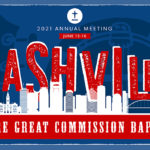Three candidates for president of the Southern Baptist Convention touted their conservative credentials while presenting competing visions for the convention during a May 4 livestreamed forum at First Baptist Church in Keller.
Candidates Tom Ascol, Bart Barber and Robin Hadaway fielded questions about critical race theory, sexual abuse, financial accountability and the parameters for cooperation between churches and the SBC.
At various points during the nearly two-hour event, all three voiced support for the self-described “conservative resurgence” in the SBC. They also affirmed the 2000 revision of the Baptist Faith & Message as providing the doctrinal parameters for cooperation. Among other things, the 2000 statement of faith limits the office of pastor to men and calls on every wife “to submit herself graciously to the servant leadership of her husband.”
Call for change
Ascol, senior pastor of Grace Baptist Church in Cape Coral, Fla., nearly 36 years and president of the Calvinist Founders Ministries, called for change in the SBC.
“I am delighted to be a part of the Southern Baptist Convention, but I am concerned about the Southern Baptist Convention. I think we need to change the direction in the way we are going, not because we’ve got rank liberals among us—I don’t believe that’s true—but I believe the winds of an acidic cultural mindset has begun to creep into some of our institutions and agencies,” he said.
Ascol described “philosophies that have come in from the world … [that] have begun to erode the foundation of our cooperative unity.” He characterized critical race theory as “an offshoot of neo-Marxism” that “basically says that all racial relationships should be viewed in terms of power dynamics, and some are inevitably oppressed, and others are inevitably the oppressors.”
The ideology of critical race theory is “part of our cultural air,” and it has made inroads into some areas of Southern Baptist life, he asserted.
“I am grieved over what I see happening,” he said. “It’s not a matter of partisanship with me. It’s a matter of deep conviction that we must change the direction of our convention right now.”
Carry out decisions of the messenger body
Barber, pastor of First Baptist Church in Farmersville and a former chairman of the Executive Board of the Southern Baptists of Texas Convention, emphasized he is a “strict constructionist” when it comes to the SBC Constitution.
Sign up for our weekly edition and get all our headlines in your inbox on Thursdays
“Really, the responsibilities of the SBC president can, I think, be grouped into three headings. It’s the president’s responsibility to protect the rights of the messenger body, to answer the questions of the messenger body, and to execute the decisions of the messenger body,” Barber said.
In regard to critical race theory, Barber said, “All you have to know about CRT to be ready to walk away from it is that it proposes some ideas about what justice is that are at odds with the Judeo-Christian idea that’s passed down into American jurisprudence.”
However, he added, it’s important to listen and seek to understand what other people mean when they refer to critical race theory and not to “talk past each other.”
“I don’t think we have to embrace secular ideologies to be kind and welcoming” to predominantly Black, Hispanic or Asian churches, he said.
‘Remember the mission’
Hadaway, who served as a Southern Baptist missionary in Africa and South America before becoming a seminary professor and administrator, said his vision for the SBC is for Southern Baptists to “remember the mission.”
“We were founded to support our North American missionaries, our international missionaries, and that’s still our primary task,” he said.
Lest he be viewed as less conservative than other candidates, Hadaway made it a point to emphasize his ties to icons of the “conservative resurgence.” He mentioned W.A. Criswell, longtime pastor of First Baptist Church in Dallas, performed his wedding, and he was ordained to the ministry by Adrian Rogers, pastor of Bellevue Baptist Church in the Memphis, Tenn., area.
Hadaway identified critical race theory as “the cultural problem of the day,” but he added, “We have to be careful we aren’t seen as unsympathetic to the problem of racism in the United States and everywhere in the world.”
Sexual abuse in the SBC
Concerning the Sexual Abuse Task Force, Barber noted it exists “because the messengers of the Southern Baptist Convention demanded that it exist.” He called that action “one of the healthiest moments in our polity in a long time, because we need to be governed by the messenger body.”
“When the full messenger body demands transparency and accountability, it happens, because our system works, and it works very well,” Barber said.
Like the other two candidates, Barber said he had not seen the task force report and recommendations yet.
However, as a general principle, he said: “I think we ought to do the right thing and do the right thing every time. And if we do the right thing and do the right thing every time, God will take care of our reputation, God will take care of our legal situation, God will take care of our financial situation, because God is holy, he calls on us to be holy, and he is the provider of all things.”
Hadaway noted his personal experience in investigating claims of sexual abuse, both as dean of students at a seminary and as a regional director of missionaries.
“I’ll say every case is unique, but there are some similarities,” he said. “When I was a regional leader supervising 300 missionaries on the field, I investigated every case myself, because it affected people’s careers.”
Ascol said Southern Baptists need to “care for victims” and “show compassion” to survivors of sexual abuse.
However, he added, “I do have real concerns that this process has been politicized.”
When crimes have been committed, “call the magistrate” to deal with legal matters, and when sins have been committed, call on the church to exercise discipline, he insisted.
“If our churches were doing what our churches are supposed to be doing, we wouldn’t have needed this investigation, because churches would be holding church members accountable,” Ascol asserted.
“If someone comes forward and says, ‘This person has been abusing me,’ you know immediately there is a victim. We’ve been told to believe all women. That’s not true. We ought to listen to all women. But there is a victim, and it might be that the person who is making the accusation has been victimized, or it might be that the person she or he is accusing is being victimized. We don’t know.”
Ascol called for churches to use “equal weights and measures” and to exercise “due diligence” to discern the truth.
Financial accountability and transparency
Candidates differed regarding the need for greater financial disclosure by SBC entities based on perceived lack of trust by Southern Baptists in SBC agencies.
Ascol asserted “the trustee system is broken,” and regularly scheduled forensic audits need to be performed to uncover any discrepancies, to discover if any crimes have been committed and to determine if there have “been shady things going on.”
Barber agreed trustees would benefit from better training, but he disputed whether Southern Baptists have lost trust in agencies and institutions, pointing to increased Cooperative Program giving and greater giving to missions offerings.
While trustees should hold institutions accountable, messengers have the right to demand greater accountability if they perceive it is needed, Barber added.
“It’s the messenger body’s right to call for any kind of financial transparency that they want for any of the entities, and if the messenger body asks for a forensic audit, it will happen,” he said.
Messengers elect trustees to govern institutions, and “you can trust what they do,” Hadaway said. Based on his experience at Midwestern Baptist Theological Seminary, he pointed out “most, if not all of the entities” have outside annual audits of their finances, but the cost of a forensic audit is prohibitive and unnecessary, he asserted.
Role of the credentials committee
Candidates also were asked about the role of the convention’s credentials committee in making recommendations about whether churches are in friendly cooperation with the SBC.
Ascol asserted he has—on several occasions—submitted the names of several churches to the credentials committee, and he never received any response from the committee.
“I think that the church that makes that request deserves the courtesy of a reply to let them know the disposition of that request,” he said.
Barber insisted the process would work better if associational credentials committees were more “vibrant and active.” He claimed during the controversies of the 1980s and 1990s, many associations said, “We’re Switzerland,” and refused to exercise its role in holding churches accountable.
“The backbone of the local association needs to be restored, so that we’re not trying to do this at the national level,” Barber said.
What needs to improve?
With regard to general areas of improvement in Southern Baptist life, Ascol called for repentance, revival and spiritual renewal.
“Quite honestly, brothers and sisters, I think we have lost the fear of God in our churches and in our convention,” he said.
He called for a renewed emphasis on the law of God, insisting the same God who gave the gospel of grace also gave the law to demonstrate what holiness means. Greater emphasis on the law would give churches a clearer understanding of what biblical love and biblical justice really look like, he asserted.
Hadaway urged Southern Baptists to reclaim a clear sense of mission, rooted in the Great Commission.
“I want to return the joy and the missions vision to the SBC, while at the same time doing the things necessary to address the issues that might come up,” he said.
Barber emphasized his desire to encourage greater participation and open dialogue among Southern Baptists.
“I hope to serve as president of the Southern Baptist Convention in a way that emphasizes and respects the voice of the messengers, moderates the meeting in a way that protects their rights, and helps them to do the best they can to bring [forward] their point of view,” he said.
Barber called on Southern Baptists to “treat one another with Christian kindness and love and respect.”
“If we don’t have civility, transparency and accountability aren’t going to help us very much,” he said.















We seek to connect God’s story and God’s people around the world. To learn more about God’s story, click here.
Send comments and feedback to Eric Black, our editor. For comments to be published, please specify “letter to the editor.” Maximum length for publication is 300 words.